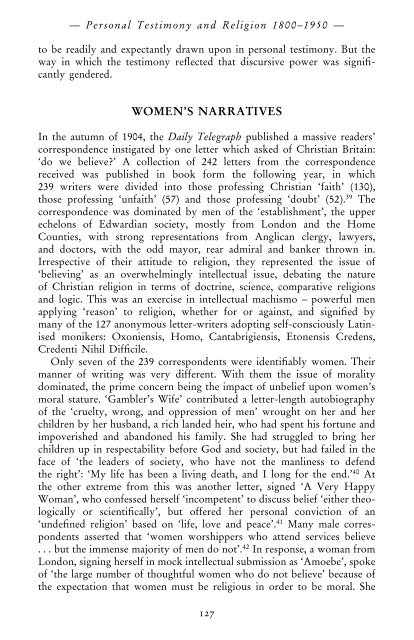The Death of Christian Britain
The Death of Christian Britain
The Death of Christian Britain
Create successful ePaper yourself
Turn your PDF publications into a flip-book with our unique Google optimized e-Paper software.
— Personal Testimony and Religion 1800–1950 —<br />
to be readily and expectantly drawn upon in personal testimony. But the<br />
way in which the testimony reflected that discursive power was significantly<br />
gendered.<br />
WOMEN’S NARRATIVES<br />
In the autumn <strong>of</strong> 1904, the Daily Telegraph published a massive readers’<br />
correspondence instigated by one letter which asked <strong>of</strong> <strong>Christian</strong> <strong>Britain</strong>:<br />
‘do we believe?’ A collection <strong>of</strong> 242 letters from the correspondence<br />
received was published in book form the following year, in which<br />
239 writers were divided into those pr<strong>of</strong>essing <strong>Christian</strong> ‘faith’ (130),<br />
those pr<strong>of</strong>essing ‘unfaith’ (57) and those pr<strong>of</strong>essing ‘doubt’ (52). 39 <strong>The</strong><br />
correspondence was dominated by men <strong>of</strong> the ‘establishment’, the upper<br />
echelons <strong>of</strong> Edwardian society, mostly from London and the Home<br />
Counties, with strong representations from Anglican clergy, lawyers,<br />
and doctors, with the odd mayor, rear admiral and banker thrown in.<br />
Irrespective <strong>of</strong> their attitude to religion, they represented the issue <strong>of</strong><br />
‘believing’ as an overwhelmingly intellectual issue, debating the nature<br />
<strong>of</strong> <strong>Christian</strong> religion in terms <strong>of</strong> doctrine, science, comparative religions<br />
and logic. This was an exercise in intellectual machismo – powerful men<br />
applying ‘reason’ to religion, whether for or against, and signified by<br />
many <strong>of</strong> the 127 anonymous letter-writers adopting self-consciously Latinised<br />
monikers: Oxoniensis, Homo, Cantabrigiensis, Etonensis Credens,<br />
Credenti Nihil Difficile.<br />
Only seven <strong>of</strong> the 239 correspondents were identifiably women. <strong>The</strong>ir<br />
manner <strong>of</strong> writing was very different. With them the issue <strong>of</strong> morality<br />
dominated, the prime concern being the impact <strong>of</strong> unbelief upon women’s<br />
moral stature. ‘Gambler’s Wife’ contributed a letter-length autobiography<br />
<strong>of</strong> the ‘cruelty, wrong, and oppression <strong>of</strong> men’ wrought on her and her<br />
children by her husband, a rich landed heir, who had spent his fortune and<br />
impoverished and abandoned his family. She had struggled to bring her<br />
children up in respectability before God and society, but had failed in the<br />
face <strong>of</strong> ‘the leaders <strong>of</strong> society, who have not the manliness to defend<br />
the right’: ‘My life has been a living death, and I long for the end.’ 40 At<br />
the other extreme from this was another letter, signed ‘A Very Happy<br />
Woman’, who confessed herself ‘incompetent’ to discuss belief ‘either theologically<br />
or scientifically’, but <strong>of</strong>fered her personal conviction <strong>of</strong> an<br />
‘undefined religion’ based on ‘life, love and peace’. 41 Many male correspondents<br />
asserted that ‘women worshippers who attend services believe<br />
. . . but the immense majority <strong>of</strong> men do not’. 42 In response, a woman from<br />
London, signing herself in mock intellectual submission as ‘Amoebe’, spoke<br />
<strong>of</strong> ‘the large number <strong>of</strong> thoughtful women who do not believe’ because <strong>of</strong><br />
the expectation that women must be religious in order to be moral. She<br />
127








